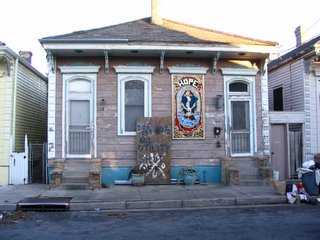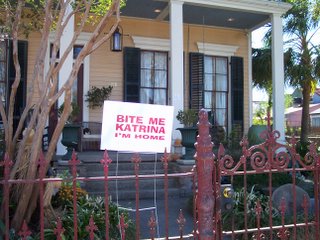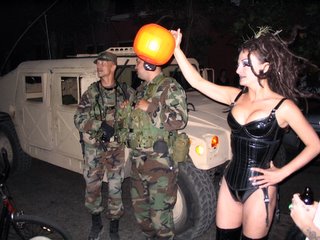
It is hard to have hope. On Thanksgiving Day, I had a (very drunken) conversation with a friend of mine, Arin, who, like me, was feeling powerless. When we were in Atlanta and volunteering for the Red Cross, it felt at least like we were connected to something. Here, I frankly don't feel much like leaving the house, and Arin and I talked about that feeling. Here, the Red Cross drives through the streets every day offering "hot meals and water," which they announce on a bullhorn, to people like me--people who really don't NEED the help. I don't want to do that work. I want to build things and influence people, and so I told Arin that what we, writers and educators, could do was write letters--to remind people that we need them not to forget us. I had written one such letter just a couple of days before, and it makes me cringe in its corniness, but it's heartfelt, at any rate, and here it is:
November 21, 2005
Dear Friends and Family,
In the six weeks since Simon and I returned to New Orleans, we have witnessed a lot of progress. The discarded refrigerators that once populated the sidewalks in front of nearly every home in our neighborhood have been removed, and along with them, the indescribable stink of their rotten contents. The coffin-flies—we’d foolishly been calling them “fruit flies”, a far too endearing term for the insatiable beasts—which once circled our heads with a third-world persistence and peppered fly-ribbons in nearly every home and business in New Orleans, have begun to die off in the cold weather that has arrived. Many of the abandoned and wrecked boats, buses, hearses, and cars that had congregated on the now-brown front yards and neutral grounds across the city have been hauled off to some unknown gravesite, and in their place, a few blades of green grass have begun to grow.
In our more immediate, daily lives, too, there has been progress. Three weeks ago, the gas was turned on. We took hot showers. We stored our Coleman stove in the backyard shed. Last week we received mail at our home for the first time—no more hour-long lines at the makeshift trailer park postal center downtown—although we have yet to receive a FedEx package my mother mailed two weeks ago. On Saturday, the Bobcats that trolled the streets for debris were replaced by a bona fide city garbage truck. (I have never been so tempted to embrace a man drenched in trash-juice.) The Chevron station at Elysian Fields and Claiborne finally has fuel. Our local coffee shop has wireless internet and fresh croissants delivered daily. And—blessing of all blessings—the Whole Foods in Metairie opened. We have grown accustomed to weekly power outages. We find comfort in the nightly rumble of Humvees. We swap FEMA stories and tell Brownie jokes. And, at least once a week, we dance.
But in spite of all this progress, it is impossible to ignore the slow pace of recovery in the parts of New Orleans that received the most damage. In the neighborhood of Gentilly, just to the north of us, where Simon’s brother, Tom, and his wife, Brandi bought a house just one month before the storm, there is no power, no water, and no one with answers. Although insured, Tom and Brandi have yet to receive word from their adjustor. Others with flood insurance have been told that because the flood was caused by levee failure, much of their losses will not be covered. I need not mention the plight of the uninsured. They, too, must wait to be told what’s next. And after weeks of benefiting from the attention and pity afforded them by the media, the hardest-hit residents of New Orleans are now, again, falling victim to the policies of a federal government with a short memory and a penchant for punishing its poor.
Certainly, it is difficult to know where to begin. If we rebuild, do we rebuild everything—even the areas that were once swampland prior to the 1950s and 60s? Or do we rebuild only in the city’s footprint prior to the construction of the levees? Can we consider rebuilding, even, when the levees are not constructed to withstand the inevitable—a Category 5? Why bother? If something like what has happened this year is going to happen again—in 100 years, 10,000 years, whatever—shouldn’t we organize an orderly retreat, instead? These are important questions, but they are the questions that are stalling our city’s progress. They are questions that have the federal government bickering, hedging, and finally, scolding us for living here.
But we live here. I live here. And I am committed to continuing to live here because, frankly, there is no other place in the world I can imagine living. Many of you have visited me here, and I think I can safely say that you all loved some part of our city. Whether we went to a Mardi Gras parade or a second-line, whether we visited the Southern Museum of Art or attended a tequila-tasting, whether we danced at Jazz Fest or late-night at the Dragon’s Den, you have all had an impression of what I am fortunate enough to enjoy year-round.
Still, it’s not the celebrations or the reveling, alone, that attracts me to New Orleans. It’s the other stuff, too. Call me crazy, but I like living in a place where I am not insulated from all that is ugly—from poverty, from neglect, from the threat of disaster. I like it not because I welcome these things, but because I cannot forget that they do, in fact, exist. Knowing this, being surrounded by it, makes me ache, but that ache makes me feel somehow more alive. As Garrison Keelor once said, in New Orleans we dance not because we feel good, but because we know it will help us feel better.
Unfortunately, our party-hearty attitude has hurt us. We grew fatalistic, complacent. We danced instead of doing anything, and now it seems that many people think we don’t deserve to dance again. A friend of mine said that living in New Orleans right now is like waking up every morning to the remnants of last night’s party. You feel so overwhelmed by the mess that you don’t know where to begin. It’s easier to mix a stiff bloody Mary and get comfortable, instead.
But we can’t get comfortable, and we need your help.
Below you will find an editorial published in Sunday’s Times-Picayune. While I’d give it an “A” in my comp-class, I find it came woefully late, and I worry that with the approach of the holidays, we will be forgotten. Who has time for writing senators when there’s turkey to be eaten, gifts to be bought? Who has time to forward emails and cut and paste letters to congress when the Christmas cards have yet to be addressed? And furthermore, who really wants to remember New Orleans when, well, it’s a real f-ing downer?
I never imagined that I would live through an event like this, and I certainly never imagined I’d have the opportunity to participate in the rebuilding of a great American city. Without getting all soapbox on you, let me just say that all of us—New Orleanians and Americans, alike, have a pretty awesome responsibility facing us. How we react to this will speak to our capacity not just to imagine the lives of others, but to act on that empathy. Remember us. Speak up for us. We cannot do it by ourselves; it’s clear by now that we have lost our credibility. We need you.
Please forward the Times-Pic editorial and the contact list that follows to your friends, coworkers, and family. If you are a teacher, ask your students to write on our behalf. Heck, give the kids some extra credit. Ask everyone to remember us during the holidays, and to send a card to Congress that asks for a new New Orleans for Christmas.
Yours,
Sarah
P.S. That is about the sappiest, corniest letter I have ever written. I’m darned emotional down here. Deal with it. ; )
An Editorial: It's time for a nation to return the favor
Sunday, November 20, 2005
The federal government wrapped levees around greater New Orleans so that the rest of the country could share in our bounty.
Americans wanted the oil and gas that flow freely off our shores. They longed for the oysters and shrimp and flaky Gulf fish that live in abundance in our waters. They wanted to ship corn and soybeans and beets down the Mississippi and through our ports. They wanted coffee and steel to flow north through the mouth of the river and into the heartland.
They wanted more than that, though. They wanted to share in our spirit. They wanted to sample the joyous beauty of our jazz and our food. And we were happy to oblige them.
So the federal government built levees and convinced us that we were safe.
We weren't.
The levees, we were told, could stand up to a Category 3 hurricane.
They couldn't.
By the time Katrina surged into New Orleans, it had weakened to Category 3. Yet our levee system wasn't as strong as the Army Corps of Engineers said it was. Barely anchored in mushy soil, the floodwalls gave way.
Our homes and businesses were swamped. Hundreds of our neighbors died.
Now, this metro area is drying off and digging out. Life is going forward. Our heart is beating.
But we need the federal government -- we need our Congress -- to fulfill the promises made to us in the past. We need to be safe. We need to be able to go about our business feeding and fueling the rest of the nation. We need better protection next hurricane season than we had this year. Going forward, we need protection from the fiercest storms, the Category 5 storms that are out there waiting to strike.
Some voices in Washington are arguing against us. We were foolish, they say. We settled in a place that is lower than the sea. We should have expected to drown.
As if choosing to live in one of the nation's great cities amounted to a death wish. As if living in San Francisco or Miami or Boston is any more logical.
Great cities are made by their place and their people, their beauty and their risk. Water flows around and through most of them. And one of the greatest bodies of water in the land flows through this one: the Mississippi.
The federal government decided long ago to try to tame the river and the swampy land spreading out from it. The country needed this waterlogged land of ours to prosper, so that the nation could prosper even more.
Some people in Washington don't seem to remember that. They act as if we are a burden. They act as if we wore our skirts too short and invited trouble.
We can't put up with that. We have to stand up for ourselves. Whether you are back at home or still in exile waiting to return, let Congress know that this metro area must be made safe from future storms. Call and write the leaders who are deciding our fate. Get your family and friends in other states to do the same. Start with members of the Environment and Public Works and Appropriations committees in the Senate, and Transportation and Appropriations in the House. Flood them with mail the way we were flooded by Katrina.
Remind them that this is a singular American city and that this nation still needs what we can give it.
Contacting Congress
Sunday, November 20, 2005
The fate of greater New Orleans' levees lies with the committees and lawmakers below. These leaders won't know how you feel about the need to upgrade greater New Orleans' flood-protection system unless they hear it from you.
Making contact can take a little effort. While some members have public e-mail addresses, others only accept e-mail via forms on their Web sites. However you communicate, use your own words, and speak from the heart.
SENATE MAJORITY LEADER
Sen. Bill Frist, R-Tenn.; 509 Hart Senate Office Building, Washington, D.C. 20510; (202) 224-3344; Web site: www.frist.senate.gov.
SENATE APPROPRIATIONS COMMITTEE
Sen. Thad Cochran, R-Miss, chairman; 113 Dirksen Senate Office Building, Washington, D.C. 20510; (202) 224-5054; e-mail address: senator@cochran.senate.gov.
Sen. Robert Byrd, D-W.Va., ranking member; 311 Hart Senate Office Building, Washington, D.C. 20510; (202) 224-3954; e-mail address: senator_byrd@byrd.senate.gov
Sen. Ted Stevens, R-Alaska; 522 Hart Senate Office Building, Washington, D.C. 20510; (202) 224-3004; Web site: www.stevens.senate.gov
SENATE BUDGET COMMITTEE
Sen. Judd Gregg, R-N.H., chairman; 393 Russell Senate Office Building, Washington, D.C. 20510; (202) 224-3324; Web site: www.gregg.senate.gov
Sen. Kent Conrad, D-N.D., ranking member; 530 Hart Senate Office Building, Washington, D.C. 20510; (202) 224-2043; Web site: www.conrad.senate.gov
SENATE ENVIRONMENT AND PUBLIC WORKS COMMITTEE
Sen. James Inhofe, R-Okla., chairman; 453 Russell Senate Office Building, Washington, D.C. 20510; (202) 224-4721; Web site: www.inhofe.senate.gov
Sen. Max Baucus, D-Mont., ranking member; 511 Hart Senate Office Building, Washington, D.C. 20510; (202) 224-2651; e-mail address: max@baucus.senate.gov
SPEAKER OF THE HOUSE
Rep. Dennis Hastert, R-Ill.; 235 Cannon House Office Building, Washington, D.C. 20515; (202) 225-2976; Web site: www.house.gov/hastert
HOUSE MAJORITY LEADER
Rep. Roy Blunt, R-Mo.; 217 Cannon House Office Building; Washington, D.C. 20515; (202) 225-6536; Web site: www.blunt.house.gov
HOUSE APPROPRIATIONS COMMITTEE
Rep. Jerry Lewis, R-Calif., chairman; 2112 Rayburn House Office Building; Washington, D.C. 20515; (202) 225-5861; Web site: www.house.gov/jerrylewis
Rep. David Obey, D-Wis., ranking member; 2314 Rayburn House Office Building, Washington, D.C. 20515; (202) 225-3365; Web site: www.obey.house.gov
HOUSE BUDGET COMMITTEE
Rep. Jim Nussle, R-Iowa, chairman; 303 Cannon House Office Building; Washington, D.C. 20515; (202) 225-2911; e-mail: nussleia@mail.house.gov
Rep. John Spratt, D-S.C., ranking member; 1401 Longworth House Office Building, Washington, D.C. 20515; (202) 225-5501; Web site: www.house.gov/spratt
HOUSE RESOURCES COMMITTEE
Rep. Richard Pombo, R-Calif., chairman; 2411 Rayburn House Office Building, Washington, D.C. 20515; (202) 225-1947; e-mail: rpombo@mail.house.gov
Rep. Nick J. Rahall II, D-W.Va., ranking member; 2307 Rayburn House Office Building, Washington, D.C. 20515; (202) 225-3452; e-mail: nrahall@mail.house.gov
HOUSE TRANSPORTATION COMMITTEE
Rep. Don Young, R-Alaska, chairman; 2111 Rayburn House Office Building, Washington, D.C. 20515; (202) 225-5765; Web site: www.donyoung.house.gov
Rep. James Oberstar, D-Minn, ranking member; 2365 Rayburn House Office Building, Washington, D.C. 20515; (202) 225-6211; Web site: www.oberstar.house.gov




